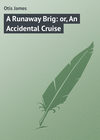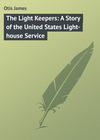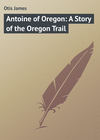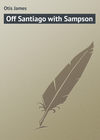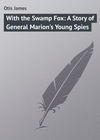Kitobni o'qish: «A Runaway Brig: or, An Accidental Cruise»
CHAPTER I.
THE SALLY WALKER
"I'm going down to the beach to find Jim Libby. If you'll come along we'll have a prime sail; and most likely this is the last chance we shall have to go out with him, for his vessel leaves in the morning."
"How can I go when I've got to mind this young one all the forenoon just 'cause the nurse must go an' have a sick headache? I don't believe she feels half as bad as I do!" And Walter Morse looked mournfully out over the blue waters with but little care for his baby sister, who was already toddling dangerously near the long flight of steps leading from the veranda of the large summer hotel.
"Can't you coax off for a couple of hours?" the first speaker, Harry Vandyne, asked.
"It's no use. Mother has gone to ride, and said I was to stay here until she came back."
Harry started toward the beach, determined not to lose a single hour of pleasure because of his friend's engagements; but before he had taken half a dozen steps a sudden, and what seemed like a very happy thought, occurred to him.
"I'll tell you how it can be fixed. Hire one of the other nurses to take care of your sister till we get back. Any of them will do it for a quarter, an' we'll be home before your mother comes."
The boys were spending the summer at the Isle of Shoals, off the New England coast. Harry's father was Robert Vandyne, the well-known ship-owner of New York, and Walter's was equally prominent in the wholesale dry-goods business on Broadway. During their stay at this summer resort they had made the acquaintance of Jim Libby, "cook's assistant and everybody's mate" on the fishing-schooner Mary Walker, a craft which visited the Shoals once each week to supply the hotels with fresh fish.
Jim was at liberty to follow the dictates of his own fancy several hours each day while in port, and the boys found him ever ready to take them out sailing in the square-bowed, leaky tender belonging to the schooner. As Harry had said, this was Jim's last day on the island until the end of another cruise, and Walter was so eager to blister his hands and wet his feet once more by rowing the Sally Walker – the tender was dignified with a name – around the shore that he really did not stop to consider all Harry's advice implied.
He wanted to go on the water; Bessie would have even better care from one of the nurses than he could give her; and it was not difficult to convince himself that, under all the circumstances, he would be warranted in disobeying the positive commands of his mother.
"She didn't know Jim was going away in the morning, or I'm sure she'd 'a' fixed it so's I could take one more trip in the Sally."
"Of course she won't care," Harry said in such a decided tone that Walter, who was more than willing to be convinced by the most flimsy argument, made his decision at once.
"Come on; there's Mrs. Harvey's maid, and we'll ask her."
The bribe of twenty-five cents was sufficient to enlist the good-natured girl's sympathies, and five minutes later the two boys were running at full speed toward the shore, while Bessie, apparently well content with the change of nurses, looked so happy that Walter really began to believe he had done the child such a very great favor that his mother could not but be pleased.
The unwieldy-looking Sally Walker was drawn up in a little cove which, owing to a line of rocks just outside, made a most convenient landing-place, and on the bow sat Master Jim, his face striped with dirt but beaming with good-nature, and his clothes as ragged as they were redolent of fish.
"I'd jes' begun to think you couldn't come, an' was goin' back," he cried as his neatly-dressed acquaintances came into view. "If we wanter do any sailin' it's time to be off, 'cause this wind's dyin' out mighty fast."
"It's better late than never, Jim," Harry cried cheerily as he commenced to push at the bow of the boat. "Let's get the old craft afloat, and do our talking afterward."
To launch the Sally into deep water was quite a hard task owing to her breadth of beam; but after that had been done the labor was ended for a time, save such as might be necessary with the bailing-dish.
Jim stepped the short mast with its well-worn leg-of-mutton sail, got one of the oars aft as a rudder, and the full-bowed clipper began to move through the water slowly, but with a splashing and a wake sufficient for a craft ten times her size.
"We can't run along the coast very well 'cause the wind's blowin' straight out to sea, an' she don't stand up to it like a narrower boat would," the skipper said as he settled himself back comfortably in the stern-sheets while he pulled the fragment of a straw hat down over his eyes.
"Let's sail before the wind two or three miles and then row back," Walter suggested. "I'd like to get to the hotel before mother comes."
"It'll be a tough pull," Jim replied as he glanced at the clumsy oars. "I'd rather row the Sally one mile than two."
"Harry and I will do that part of the work."
"Then let her go," and as Jim eased off on the sheet the old craft came around slowly, for she was by no means prompt in answering the helm.
"See that ship over there? How far away is she?" Harry asked as he pointed seaward, when the Sally was well under way.
"That ain't a ship," Jim replied with a slight tone of contempt because his companions were so ignorant. "She's a brigantine, an' hard on to three miles from here."
"Let's run over to where she is. We can row back by dinner-time easily enough."
Since his crew were to do all the work on the return trip Jim would have been perfectly willing had the distance been twice as far, and he gave assent by nodding his head in what he intended should be a truly nautical manner.
The brig, which was now the objective point of the trip, appeared to be a craft of about three hundred tons, and moving through the water slowly, under the influence of the rapidly-decreasing wind, on a course at right-angles with the one the Sally was pursuing. She was running with yards square, under her upper and lower topsails, foresail, jib and foretop-mast stay-sail, and the head-sheets were flowing.
"She ain't goin' so fast but what we can come up with her before the breeze dies away, I reckon, an' if she's becalmed they won't say anything agin our goin' aboard," Jim said after a few moments of silence, during which all hands gazed intently at the stranger.
The idea of visiting a vessel at sea was very enticing to the city boys, and they were now as eager for a calm as they had previously been to have the wind freshen. The Sally took in so much water between her half-calked seams that it was necessary to keep the bailing-dish in constant use, consequently there was little time for speculation as to where the brig was bound until, when they had sailed not more than a mile and a half, Jim said in a tone of mild disappointment:
"It's no use, fellers, we can't get there. It's dead calm, an' we ain't makin' a foot an hour."
"What's to prevent our rowing?" Harry asked. "You take down the sail and keep the bailing dish going while Walter and I show you how to make the Sally walk."
"I'm willin' if you are," and Jim unshipped the stumpy mast. "My vessel won't get under way before mornin', an' it makes no difference if I ain't back till sunrise."
To make the Sally "walk" required a great deal of hard work; but since it was under the guise of play Harry and Walter went at it with a will, while Jim wondered what sport boys could find in pulling a heavy boat, for this was the one portion of a fisherman's life at which he rebelled.
Slowly but surely the little craft gained upon the larger one, which swung to and fro on the lazy swell, and when they were about a quarter of a mile apart Jim said, in a tone of disapprobation:
"The crew on that brig are worse'n fishermen. Every one of 'em must be below, for I haven't seen so much as a feller's nose yet. Perhaps some of the crew have gone ashore – the gangway's unshipped."
Unacquainted with nautical matters as the city boys were, they did not think there was anything strange in such a condition of affairs, but kept steadily at work with the oars until Jim scrambled into the bow to fend off, the journey having been finished.
"I'll make fast here while you go aboard," he said as he seized the ladder of rope and wood which hung over the rail as an invitation to visitors.
"We'd better find out first whether they're willing to have us," Harry suggested.
"That'll be all right," and Jim spoke very confidently. "If you're afraid I'll go first; but it seems kinder strange that somebody don't hail us."
Having made the Sally's painter fast, Jim clambered over the side closely followed by his companions; but not a person could be seen on deck. The fore hatch was lying bottom upward, and the appearance of the ropes indicated decided carelessness on the part of the crew, yet no sound was heard save the creaking of the booms as they swung lazily to and fro.
"What's the matter?" Harry asked in a whisper as he noted the look of fear which came over Jim's face.
"I'm sure I don't know. Let's see if we can raise anybody;" and then Jim shouted, "Ahoy below! ahoy!"
No reply came. Again and again was the cry repeated, until Walter asked, impatiently:
"Are you afraid to go into the cabin and stir them up?"
Jim would have braved many dangers rather than be thought a coward, and without answering the question he leaped down from the rail, running first into the forecastle and then the cabin, after which he returned to his companions with a very pale face as he said, in a tremulous whisper:
"Boys, there ain't a single soul on this 'ere brig but ourselves, an' there's a sword on the cabin floor! Do you s'pose pirates are anywhere around?"
CHAPTER II.
THE BONITA
Harry and Walter remained motionless and speechless on the rail staring at Jim for several moments after this startling announcement had been made, and there was a decided look of fear on the faces of all three. The mere suggestion of pirates was enough to send the cold chills down their spinal columns, while the mystery connected with the abandonment of an apparently sound craft caused them to feel very uncomfortable in mind.
Walter glanced apprehensively over his shoulder as if expecting to see some terrible sight seaward, and the slightest ominous sound would have sent the visitors into the Sally as the only place of refuge.
It was fully five minutes before Harry succeeded in gaining the mastery over his fears, and then he said, with an evident attempt to make his voice sound firm as he leaped from the rail:
"Say, boys, we're making fools of ourselves by getting frightened at an empty ship! Suppose the pirates have been on board; there are none here now, and I don't see any reason why we shouldn't go below."
"I'm with you," Jim replied; but by taking up his position at Harry's side he showed very plainly that it was not his intention to lead the exploring party.
"I'll go, too, rather than stay on deck alone; but, according to my way of thinking, we'd better start for the Isle of Shoals instead of staying on a vessel like this." And once more Walter looked over the rail at the Sally, which was taking in water quite rapidly now that the bailing-dish was idle.
Harry and Jim had started toward the cabin before Walter ceased speaking, therefore he had no choice save to follow them, and with an undefined feeling of awe the three went down the stairs into a comfortably but not expensively furnished saloon, from each side of which led the eight state-rooms.
To judge by the general appearance of affairs one would have said that the officers had but just gone on deck. On the long, stationary table were sewing materials and a woman's work-basket; in one of the chairs an open book, and on a locker was the log-slate with the reckoning partially worked out.
The only suspicious object to be seen was a sword, which had been withdrawn from its scabbard and thrown on the cabin floor. The blade was covered with spots which might have been blood-stains or nothing but rust, and the visitors gathered around the sinister-looking weapon without offering to touch it.
"The sword doesn't prove that pirates have been here," Harry said, after a long silence. "There couldn't have been much of a fight or we should see more signs of it. Perhaps somebody is in one of the state-rooms."
"It won't take long to find out." And Jim boldly opened the nearest door, a goodly portion of his courage having returned since the search thus far had failed to reveal any very horrible sight.
In rapid succession the searchers went from one room to another, stopping at each only long enough to make sure no person was concealed therein, and to take a general but hasty survey of its contents.
Every tiny apartment showed signs of recent occupancy. A sea-chest, clothes hanging on the walls, and such belongings as a sailor would deem necessary for a long voyage, could be seen. In one state-room was a set of gold studs and sleeve-buttons and a new quadrant. In another, which Jim confidently asserted was the captain's, a watch hung at the head of the berth, while a small writing-desk was littered with papers.
"All hands have gone somewhere, that's certain," Jim said when the search was concluded; "an' before we go ashore it won't do any harm to have dinner. If the pantry has been left like the cabin, we stand a good chance of finding plenty of grub."
"I'm hungry enough to eat almost anything," Harry replied with a laugh. "So if you know where the food is kept we'll have lunch before beginning the long pull home."
Jim was thoroughly well acquainted with the general arrangement of vessels of this size, and without hesitation he led the way to the pantry, where was found a large assortment of delicacies for the cabin table.
In this room were many boxes and packages which had not been broken, and as each bore the mark "Brig Bonita," the name of the craft was known as well as if the boys had seen the gilt letters under the stern.
Just at this time, however, the visitors gave but little heed to anything connected with the abandoned craft save the provisions, and these they sampled generously, beginning with nuts and ending with jam; each one eating until it was an absolute impossibility to swallow another mouthful.
During the varied but hearty meal they failed to notice that the brig had heeled over slightly, or that there was considerable more motion than when they first came aboard. The feast drove all thoughts of the general condition of affairs from their minds until it was finished, and then Jim said:
"Now, what's to be done? It seems a pity to leave this craft and all these things; but I don't s'pose we could tow her in to the Shoals."
Even though Harry and Walter knew nothing about seamanship, they understood how ridiculous it would be to make any attempt at towing a three-hundred-ton brig with a crazy little boat like the Sally, and their merriment was so great when Jim made this remark that he thought it necessary to defend himself by saying:
"I've seen folks tow bigger vessels than this; an' I was only thinkin' how fine it would be to take her in, for since there's nobody aboard we'd own everything."
"Well, so long as it can't be done we'd better go back," Walter said as he suddenly remembered his neglect of duty and the very grave reason why he should be at the hotel before his mother returned.
Neither Harry nor Jim believed there was any necessity for making a hurried departure, and fully half an hour more elapsed before they were ready to go on deck. Even then they would have delayed still further had not a violent motion of the vessel caused Jim to cry, as he sprang toward the companion-way:
"The wind has freshened, and if we want to get back to-night it's time we were off!"
Then, as he gained the deck, fear and surprise took the place of his suddenly aroused anxiety. The wind had sprung up and must have done so a long while before, for now there was no sign of land in either direction, unless, indeed, a dark smudge far down to windward might be the island which had been so close aboard a few hours previous, and the Bonita was working on a zigzag course seaward. Owing to the fact that the head-sheets were flowing, each time she fell off sufficiently to get the wind abaft the beam she would fill her topsails and gather way, then come to, stop, and again fall off; making, as a sailor would say, "boards and half-boards."
Harry and Walter were so thoroughly amazed and alarmed by this sudden disappearance of the land, as it were, that they gave no heed to anything around them, but stood by the port rail amidships, searching in vain with their eyes for the island.
Jim's knowledge of seamanship was decidedly limited; but he understood fully why the Isle of Shoals was no longer in sight, and his one thought was how they could leave the vessel, which was literally running away with them. Springing to the main chains where the Sally had been made fast, a single glance was sufficient to show of what little service she would be to them just then. Leaking as she did, and towed now and then at a rapid rate, the little craft was filled with water, nothing save a very small portion of the bow upheld by the painter being visible.
Hardly knowing what he did, the young fisherman ran fore and aft in a distracted way until Harry, aroused from his stupefaction by Jim's apparently aimless movements, asked in a sharp tone of nervous irritation:
"What are you doing? Are we to stay here without trying to get back?"
"I wish you would tell me what we can do;" and Jim stopped short as he plunged his hands deeply in his pockets, looking Harry squarely in the face. "The Isle of Shoals must be a dozen miles away by this time; the Sally is swamped, an' there's nothin' in the shape of a boat on board."
"But we can't stay here and be carried out to sea!" Walter cried in a shrill tone of fear.
"If you think it's possible to swim back we won't stay; but I don't know of any other way to get there!"
For an instant Walter acted as if he intended to make the attempt; and then, as Harry seized his arm to prevent him from leaping overboard, the poor boy gave way to the most passionate grief, he began to realize the full consequences of his disobedience, and could he have been transported to the land just at that moment, Bessie would have opened her eyes wide in surprise at the great display of brotherly affection.
It seemed as if Walter's tears served to restore to Jim at least a portion of his senses, for he immediately assumed a business-like tone as he said:
"Now see here, fellers, we're in a scrape of course; but it won't do any good to give up like this, 'cause if we try to help ourselves things may turn out all right."
"If we can't get back in the Sally I don't see how we're going to help ourselves very much," and Harry made every effort to appear brave that Walter might be cheered.
"Some vessel will surely heave in sight before long, an' we can signal to her. The first thing is to find a flag an' set it half-mast, union-down. Any craft would try to find out what the matter was after seein' a thing like that, an' jes' as likely as not we'll be picked up before dark. Then we must get some of this canvas off of her so she can't sail so fast, an' when that's done matters won't be so very bad, for we can keep goin' straight ahead till we come out somewhere."
Jim spoke in such a matter-of-fact tone that the courage of his companions was revived at once. They had not thought of the possibility that a vessel might be sighted; but now it seemed very probable, and the two boys set about the proposed task with hopeful hearts.
The wind continued to freshen, and in her limping way the Bonita worked slowly but surely seaward with a wide expanse of ocean before her, while the force on board was hardly sufficient to keep the helm steady in heavy weather.
CHAPTER III.
A SMALL CREW
As they searched for the flag-locker Jim did his best to keep hope alive in the hearts of his companions by talking as if it was impossible they could run many hours longer without meeting some craft from which assistance could be procured; but even as he spoke he knew it would not be strange if a week, or even more, elapsed before anything larger than a sea-bird's wing came within their range of vision. He had been in the Mary Walker on the fishing banks when it was known there were many vessels in the vicinity, and yet not a sail was seen for ten days. While the wind held in the same direction the Bonita would be too far north to sight any of the coastwise traders, and Jim was well aware that it might be a long while before they could summon aid.
The flag-locker was found after a short search, and when the stars and stripes were hoisted as a signal of distress the bright colors appeared to afford Harry and Walter no slight amount of relief.
"If a vessel comes within sight that must attract attention," Harry said hopefully. "I don't suppose any captain would pass us by without at least asking what was the matter."
"It would be a pretty mean sailor who wouldn't try to help us," Jim replied; and then, as the thought came that it might be many days before the flag would be seen by any one save themselves, he added in a voice which was far from steady, "Now let's try to hoist the Sally inboard. She'll be knocked to pieces if we tow her, an' there's no knowin' how soon she may be needed."
"Tell us what to do and we'll obey orders," Harry said cheerily. "I'm not sure but we can run this craft as well as a full crew could, so long as you know enough to be captain."
Jim was thoroughly well aware of his own ignorance; but no good could be gained by admitting such a fact, and he began to give commands in a very loud tone, as if the noise would drive away his dismal forebodings.
There was no lack of blocks which could be used, and by fastening a whip to the Sally's bow she was soon hauled in over the rail minus her cargo of water.
"If we stay here long enough we must calk the seams," Jim said as he wiped the perspiration from his face. "It won't be a hard job, an' we may need her pretty bad."
"Why not do it now?" Walter asked.
"Because we ought to got some of this canvas in before it blows any harder; but it would puzzle a better sailor than I am to know how it's to be done unless we leave everything loose."
Neither Harry nor Walter could give any advice, and Jim was forced to > work out the problem unaided.
"I'll tell you what it is," he said, after studying the matter in silence several moments. "It won't do to strip her entirely, for then we couldn't keep steerage-way on. The jib, foretopsail, and mainsail won't be more'n enough to steady her, and if the wind don't come any stronger, I reckon we can take care of the helm."
"Do you mean that we're to pull down them big pieces of canvas?" Walter asked in dismay.
"If I did mean that, it couldn't be done. By carrying the halyards to one of the winches, though, we can clew them up after awhile; but it'll be kinder hard work."
Then Jim set about the task which at first sight appeared to be impossible, and, incredible though it may seem, had before dark stripped the brig of all the canvas save what he proposed to keep her under while the weather remained fair. His slight knowledge of seamanship was sufficient to show him how work should be performed, and with the winch as a very material aid the huge squares of canvas were clewed up after rather a clumsy fashion.
When this had been done Jim went to the helm, which he lashed in one position when the task of shortening sail was first begun, and soon the Bonita was sailing properly dead before the wind, but in a lazy manner, as if sulking because deprived of so many of her white wings.
"That's a good job well over," he said with a long-drawn sigh of relief. > "Now, if it blows very hard, we can soon get rid of the mainsail and jib."
"Where are we heading for?" Harry asked, the severe labor having in a certain measure dulled the grief in his heart.
"I don't know – straight across the ocean I reckon," Jim replied; and then observing that his companions had noted the look of anxiety on his face, he added in a lighter tone, "It seems kinder funny that we three boys should be sailin' this craft like as if she was our own – don't it?"
"I wish we'd never seen her nor the Sally Walker," Walter cried passionately. "Nobody knows when we can get back, and our parents will think we meant to run away!"
"Now, don't get to feelin' bad ag'in," Jim said soothingly. "It won't do any good, an' you'll be jes' so much the worse off. We've got to have supper, an' who'll be cook?"
"I'll do what I can toward it; but I don't believe I'd know how to make even so much as a cup of tea," and Harry rose to his feet.
"Jes' bring up a lot of grub from the pantry; that'll be enough. To-morrow I'll show you how to steer, an' take a turn in the galley myself."
Harry beckoned Walter to follow him; for, if the truth must be told, he felt rather nervous about going into the cabin alone. Now that they were on the open ocean, at the mercy of wind and wave, the deserted saloon seemed peopled with things none the less horrible because unseen. Every inanimate object had suddenly taken on a most sinister appearance; and the rusty sword on the floor seemed to bear witness of the tragedy which had caused a sound, well-found vessel to be abandoned in such haste.
Neither of the boys cared to look around the saloon in which the shadows of night were gathering. They walked swiftly through into the pantry, selected such articles of food as were nearest at hand, and then went on deck very quickly.
Jim had lashed the helm again and was in the maintop looking seaward in the vain hope of seeing a sail, and his apparent calmness, together with the warm breeze, the water sparkling under the rays of the setting sun, and the regular movement of the brig as she rose and fell on the swell, served to banish the fears caused by that desolate-looking cabin.
When twilight came, that time when homesickness always appears with redoubled violence, the three involuntary voyagers were eating a meal composed chiefly of delicacies, and Jim understood that his companions must be prevented from dwelling upon their own condition; therefore, as a means of cheering all hands, himself included, he proposed to spin a yarn in true sailor fashion.
From the number of so-called ghost stories which the crew of the Mary Walker were wont to relate during their leisure moments he chose the most horrible, and some time before it was concluded he understood that he had succeeded in banishing homesickness at the expense of an invitation to fear. Even he himself began to be afraid because of his own "yarn," when it was told on the deck of a vessel so mysteriously abandoned as had been the Bonita, and the sighing of the night-wind through the rigging sounded very "ghostly" in his ears.
The three boys huddled close together, neither speaking above a whisper until after the moon rose, and then matters began to seem more cheerful. Jim changed the unpleasant current of thought by speculating upon the strange sights they might see if it was possible for them to keep the brig on the same course until they made land, and by ten o'clock all hands had so far gained the mastery over fear that the young captain proposed an arrangement for the night.
"We can't stay awake all the time," he said sagely, "so s'posin' you fellers go below an' turn in. If the wind dies out much more I'll lash the wheel an' join you; but if it don't one of you will have to spell me 'long toward mornin'."
"I don't care about going below," Walter replied in a half-whisper. "Why can't we sleep out here on deck?"
"There's nothin' to prevent it; but you'll be cold before mornin' if you don't get some blankets from the cabin."
Even Harry was timid about venturing into the saloon since that particularly horrible ghost story had been told; and very likely Jim understood this fact, for he said, after a brief pause:
"If you'll hold the wheel, Walter, an' Harry will come with me, I'll get the bedclothes."
This proposition was accepted, and a few moments later a mattress and half a dozen blankets were spread out on the deck aft, the whole forming such a bed as even less tired boys would not have despised.
There was yet sufficient food remaining from the supply brought for supper to serve as a lunch in case any of the party grew hungry before daylight; therefore, as Jim said, "they were pretty well fixed for the night." The wind was decreasing each moment, and, regardless of the possibility that it might spring up again from a different quarter, the helm was lashed amidships that all hands might sleep.
"I reckon some of us will wake up if it blows hard, an' considering that we don't know where we're goin', it can't make much difference whether anybody is at the wheel or not."
The young fisherman laid down as he ceased speaking, and his companions, in blissful ignorance of the possible danger to be incurred by this unseamanlike proceeding, seeing nothing rash or strange in thus leaving the brig to care for herself, followed the example of their commander.
The bed was hardly as soft as Harry and Walter had been accustomed to sleeping on, perhaps; but it was not uncomfortable, and in a few moments all three were in dreamland.
